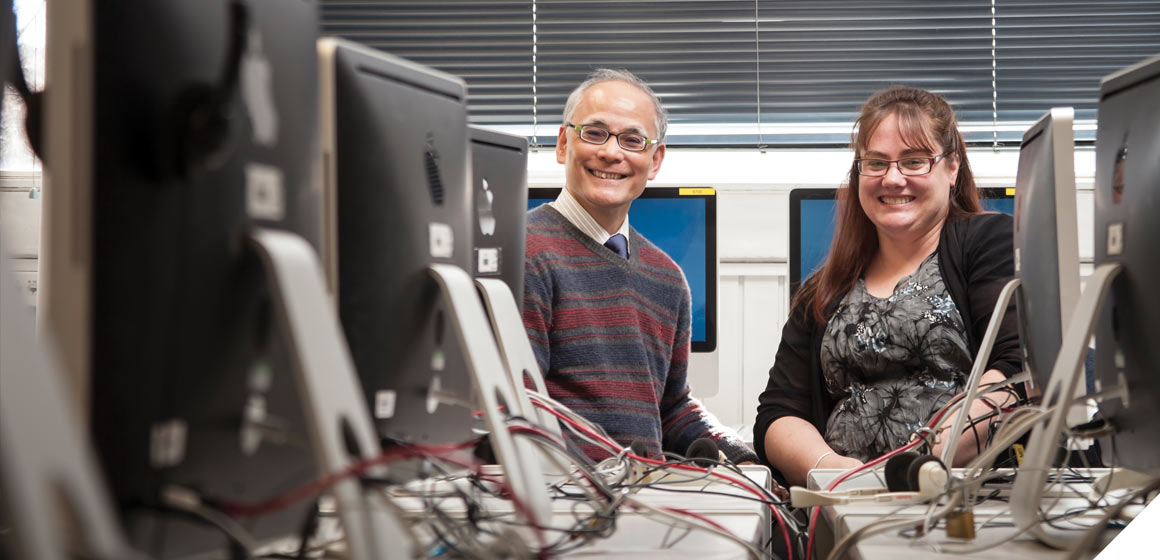
Using videoconferencing and ICT (information and communications technology) to create a virtual classroom is one thing, but Professor Kwok-Wing Lai, director of the Centre for Distance Education and Learning Technologies (College of Education), is using digital technologies to help children work collaboratively as "knowledge builders", even though they live in different parts of the country.
"Knowledge building uses an innovative approach to develop students as active learners, by engaging them in a progressive inquiry process to generate theories and new knowledge," explains Lai.
Students conduct research and discuss ideas in class or by videoconferencing, and also use a web-based networking software, Knowledge Forum, to build ideas.
"The key thing is to develop students as knowledge builders in the knowledge society."
"The key thing is to develop students as knowledge builders in the knowledge society. They create and build on ideas and knowledge within the class community, and engage in progressive problem solving," says Lai.
"The learning environment will scaffold you to focus on generating ideas, the whole community will work on them and eventually come up with a solution
or a theory."
The two-year Teaching and Learning Research Initiative project, funded by the Ministry of Education, is the first time knowledge building has been facilitated in online classes, and meets NCEA requirements.
Sixteen senior secondary classes and eight teachers are involved, covering a variety of subjects from biology and chemistry through to classics and art history.
In the last three years, more than 150 Year 13 high-achieving science students from rural and low-decile schools have also been involved in virtual Knowledge Forum discussions set up by Lai in the Otago University Advanced School Sciences Academy (OUASSA), jointly funded by the University and Ministry of Education.
Students as young as five can engage in knowledge building, says Lai. He is this year using the knowledge building model in research in two primary schools – and one of the three classes involved is a new-entrants' class. He is also building a community for the teachers. A knowledge building symposium in 2012 attracted 40 teachers and another was planned for November 2013.
Virtual learning: a win-win for rural schools
Information and communications technology (ICT) is offering a way of not only keeping senior high school pupils in rural schools, but encouraging specialist teachers to stay as well.
Dr Keryn Pratt (Centre for Distance Education and Learning Technologies, College of Education) has been heading a study working with rural schools around Otago and says the loss of teachers and students needs to be addressed.
"When you've got a chemistry teacher but no students who want to do chemistry, or you have three students who want to do biology but no biology teacher, how do you deal with that?" she says.
"And how can we keep specialised teachers in our rural schools? A chemistry teacher is not going to stay if they never get to teach chemistry."
Traditional correspondence methods were not working so an internet and videoconferencing system has been established whereby a teacher in Roxburgh can teach physics to pupils in Lawrence and Cromwell, while a teacher in Lawrence can be teaching biology to students in other rural towns.
OtagoNet began with a one-hour videoconference once a week and, over time, more internet-based learning has been added, providing students with documents and links to videos.
"The original focus was on 'show us how to use this technology', whereas now it's very much about 'this is how we want to teach and how can we make the technology work for us?' It's a nice shift."
Pratt says they are finding that the teachers involved are also making this material available for their regular students as well.
"The original focus was on 'show us how to use this technology', whereas now it's very much about 'this is how we want to teach and how can we make the technology work for us?' It's a nice shift."
Online teaching has also shifted from a "talking heads" approach, delivering as much information as possible, to using the hour for a tutorial-style situation where students get to ask questions.
Pratt says that, until this study, it was generally thought distance teaching only worked for bright and motivated students, but they have found almost any student can succeed at this, given the right support. It also helps students make the transition to more self-reliant learning at university.
There are currently 15 clusters of schools participating through the Ministry of Education's Virtual Learning Network, involving mostly Year 11-13 students from around 200 individual schools. Subjects offered from the schools and other providers range from biology, history, media studies and Japanese, to digital photography, agriculture, physical education and horticulture.
Funding
Professor Kwok Wing-Lai
- Teaching and Learning Research Initiative
- University of Otago Research Grant
Dr Keryn Pratt
- Community Trust of Otago
- Teaching and Learning Research Initiative
- University of Otago
